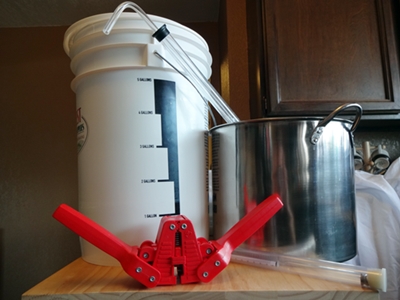by Joe Walker, MS, RD, guest author
Joe Walker MS, RD, is a registered dietitian, a homebrewer, and a woodworker with many more diverse interests. He holds a bachelor of science degree in nutrition and dietetics, a graduate certificate in dietetics, and a master of science degree in human development and leadership. His wife has multiple food allergies that have inspired him to specialize in food allergies as a means of helping her as well as others. He is the owner of Thinking Tree LLC, which provides a number of informative websites, such as GlutenFreeBeerBrew.com
interests. He holds a bachelor of science degree in nutrition and dietetics, a graduate certificate in dietetics, and a master of science degree in human development and leadership. His wife has multiple food allergies that have inspired him to specialize in food allergies as a means of helping her as well as others. He is the owner of Thinking Tree LLC, which provides a number of informative websites, such as GlutenFreeBeerBrew.com

If the only beer you can enjoy has to be gluten-free, home brewing will allow you to enjoy a variety of options and flavors that aren’t commercially available. Plus, home brewing gluten-free beer can be empowering for a person with Celiac Disease or gluten intolerance. It provides a means by which to overcome some of the dietary restrictions faced on a daily basis.
The hobby of home brewing isn’t something pursued by only a few select rebels in dimly lit basements. This is a hobby that has grown exponentially in popularity over the last decade among many diverse segments of the U.S. population. There is no “typical” homebrewer and there simply isn’t an accurate stereotype for those who brew beer at home. For example, I’m a Registered Dietitian, and I brew beer at home.
My background in nutrition gives me a unique perspective on this hobby, and my wife’s gluten intolerance has inspired me to experiment with gluten-free beer brewing. Can you really make beer that contains no gluten? The answer depends on how you define beer, but regardless of how beer is defined, you can absolutely make a beverage with carbonation, malty flavors, hop aromas and bitterness, and alcohol. There are some people that claim that beer must be made from barley and/or wheat, but very beer-like beverages can be made without the use of such gluten-rich grains.
This is great news for people with Celiac Disease or a gluten intolerance that previously appreciated the rich variety of craft beers available today. This is also great news for traditional homebrewers who might otherwise quit brewing beer when they learn that they, or a loved one, must avoid gluten. Sure, a person could just switch to drinking or brewing wine, but for a true beer lover, wine simply isn’t an equivalent substitute.
Why even bother with beer brewing at home anyway? After all, beer and gluten-free beers can be quickly and easily purchased in many liquor stores. Well, you can buy a cake in a store too, but people still bake cakes at home. Wooden tables, chairs, and other furniture items can be purchased in a store too, yet many people find joy in woodworking.
 What draws a person to beer brewing at home can be very different among a group of homebrewers. Often there is an underling appreciation for beer and a do it yourself attitude that blends with curiosity, which compels a person to brew beer. Some people are also intrigued by the chemistry, biology/microbiology, historical significance, or food science of beer brewing. Are you? I’ll assume that since you’re still reading you must be at least a little curious. Let me feed your curiosity with a simple introduction to gluten-free beer brewing.
What draws a person to beer brewing at home can be very different among a group of homebrewers. Often there is an underling appreciation for beer and a do it yourself attitude that blends with curiosity, which compels a person to brew beer. Some people are also intrigued by the chemistry, biology/microbiology, historical significance, or food science of beer brewing. Are you? I’ll assume that since you’re still reading you must be at least a little curious. Let me feed your curiosity with a simple introduction to gluten-free beer brewing.
Home brewing any beer requires just a few equipment items that are often found in convenient home brew kits. A 5 gallon pot and a 5 gallon food-grade bucket often form the core of such kits. Other items, such as an air lock, specific gravity meter, thermometer, and bottle caper are usually found in such starter kits too. For a more in depth look at the equipment needed to start brewing your own beer, check out this link.
Along with a home brewing starter equipment kit, an aspiring gluten-free homebrewer needs ingredients and a recipe. For someone with no beer brewing experience, I’d recommend starting with a gluten-free beer ingredient kit before attempting to follow a special recipe or crafting a new recipe. Some very easy and affordable ingredient kits can be found at http://glutenfreebeerbrew.com/3-easy-gluten-free-beer-homebrewing-kits. Also, I’m providing a simple gluten-free beer recipe below. This is a good, yet very easy recipe to help new brewers get their feet wet.
Recipe for Gluten-Free Pale Ale: (5 Gallon Batch)
6 lb. Briess White Sorghum Syrup
1 oz. Cascade hops** (boil for 60 minutes)
1 oz. Cascade hops** (boil 2 minutes)
1 oz. Cascade hops** (dry hop 3-7 days)
1 pkg. Fermentis US-05 dry yeast (gluten-free)
1 cup Honey (for bottling)
**Also, try this recipe with other American hops like Ahtanum, Amarillo, Glacier, Palisade, etc. If using high-alpha varieties, such as Columbus, use only 0.5 oz. for the bittering addition.
The process is super simple and you just need to follow a few steps, just as you would for any recipe. The sorghum syrup is dissolved in hot water which is then brought to a boil. Hops are added, and later in the boil more hops can be added to suite a person’s taste. Additional sugars can be added to provide more food for the yeast to later convert into carbon dioxide and alcohol. Honey, brown rice syrup, agave nectar, corn sugar (dextrose) and granulated sugar are some of the options regularly used.
At the end of the boiling process, which is typically 30 to 60 minutes long, you might add more hops for aroma and then let the whole pot of “wort” (unfermented beer) cool to under 80 degrees F. Then you dump it into a sanitized fermenting bucket, stir vigorously to add oxygen to the wort. Then toss in some dry yeast, seal up the bucket, and add the airlock. After allowing the bucket to sit in a cool dark place for anywhere from 1 to 3 weeks, a batch of beer will be born. Praise Ninkasi (the Sumerian goddess of beer)!
There are a few more steps involved, such as letting the beer “bottle condition”, which allows the yeast to make carbonation in the bottled beer. However, that is extract home brewing in a nutshell. It really is simple, and the process allows for a wide range of flavor and ingredient experimentation such as the addition of orange peel during the boil or even herbs and spices. Go ahead, give it a try. You might never buy beer from a store again!
Please Note: Always drink alcohol containing beverages in a responsible manner and in moderation. Joe Walker MS, RD does not advocate or promote binge drinking or excessive drinking that leads to altered mental status or physical/mental impairment. Simply put, be smart, be safe, and be responsible. If you don’t consume alcohol containing beverages, don’t start. GOVERNMENT WARNING: (1) According to the Surgeon General, women should not drink alcoholic beverages during pregnancy because of the risk of birth defects. (2) Consumption of alcoholic beverages impairs your ability to drive a car or operate machinery, and may cause health problems.
Thanks Joe!
Follow Joe:
To read more CeliacCorner guest author articles click here.
Cornell Adkins
June 3, 2013 at 1:32 pmThe local craft beer craze and the gluten-free movement are joining forces in the form of a gluten-free brewery that’s getting ready to open in St. Paul.
Leslie
May 22, 2013 at 6:07 pmEnjoyed learning about this Joe.
TimT
May 13, 2013 at 3:36 pmCool article. I’ve been thinking about home brewing.
Jennifer
May 7, 2013 at 8:54 pmMy husband is a home brewer and he just received a diagnosis of a gluten sensitivity. I will pass along your article to him – THANK YOU
Mayte Gonzalez
May 7, 2013 at 10:47 amVery interesting. I have not found a gluten free beer that I like yet. I’ll visit your website.
James
May 7, 2013 at 10:30 amThanks. I’ve often thought of brewing my own beer. Good info here.